The distinct and pungent odor of cat urine is a common household woe for cat owners. While cats are generally known for their meticulous bathroom habits and ease of litter box training, accidents do happen. In fact, inappropriate elimination is a significant reason why cats are surrendered to animal shelters.
Key Points to Remember
-
Cats often revisit locations where they’ve previously urinated, especially if residual smells persist.
-
While certain scents like vinegar and peppermint are aversive to cats and might discourage them from urinating in specific areas, addressing the underlying cause of the behavior is crucial for a lasting solution.
-
Consulting a veterinarian to rule out medical issues is the first step when your cat is peeing outside the litter box. Identifying and addressing the root cause of the behavior is essential for effective resolution.
-
-
This article explores the use of scents disliked by cats as a potential deterrent for inappropriate urination. However, it also delves into why relying solely on this method is often ineffective and may not solve the core problem.
The Power of Scent: How Cats Perceive the World
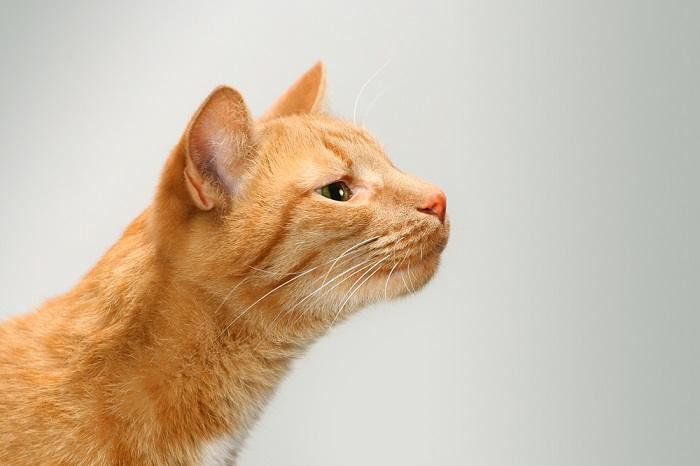 Cat intently sniffing the air
Cat intently sniffing the air
Cats possess an extraordinary sense of smell, far surpassing that of humans. Their olfactory acuity is a vital tool for navigating their world. With over 200 million scent receptors in their noses – a staggering 40 times more than humans – cats experience smells in a way we can scarcely imagine. Furthermore, they have a specialized vomeronasal organ, also known as Jacobson’s organ, located in the roof of their mouth. This organ is dedicated to detecting pheromones, chemical signals that play a key role in feline communication.
This remarkable sense of smell, inherited from their wild ancestors, is integral to various aspects of a cat’s life. It’s crucial for identifying other cats, interpreting social cues, locating prey and food sources, and recognizing potential dangers.
Cat urine is inherently strong-smelling and concentrated. It serves as a significant communication tool, laden with pheromones that convey messages related to territorial boundaries and reproductive status. Urine from male cats is particularly potent due to high concentrations of hormones and pheromones, signaling their availability to female cats and warning rival males to stay away.
Eliminating Cat Pee Odor: Why Thorough Cleaning is Essential
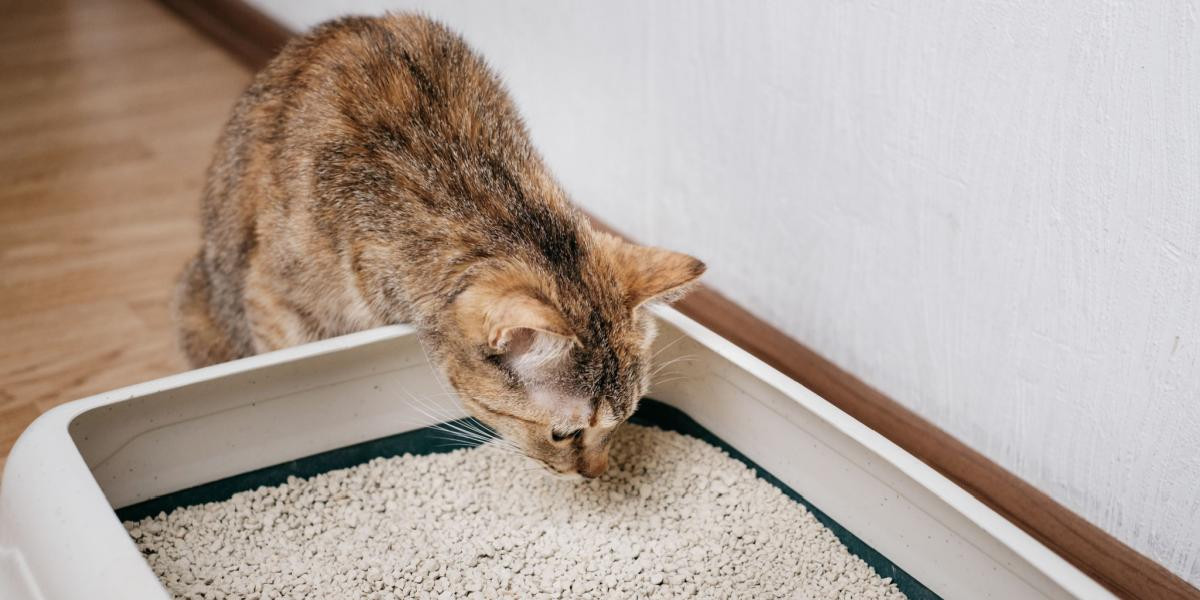 Cat smelling inside a clean litter box
Cat smelling inside a clean litter box
Even faint lingering urine odors can attract a cat back to the same spot, leading to repeat offenses. If a cat urinates in an undesirable location, thorough cleaning is paramount to eliminate residual smells that are imperceptible to humans but highly noticeable to cats. Failure to eliminate these odors can inadvertently designate that spot as an acceptable toilet area for your cat.
Avoid cleaning products containing ammonia, as their scent closely resembles urine and can reinforce the cat’s urge to urinate in the same location. Enzyme-based cleaners specifically formulated for pet accidents are the most effective choice. These cleaners are designed to break down urine components, neutralize odors, and remove stains safely.
Baking soda is another effective and natural odor absorber. It can be sprinkled on the affected area to soak up urine and eliminate smells. Vinegar, a non-toxic household cleaner, is also useful. Its strong, pungent smell is unpleasant to cats, which might further discourage them from returning to the area. For more detailed guidance, resources on how to get rid of cat pee smell and top cat urine removers offer valuable insights.
Scents Cats Dislike: Potential Deterrents?
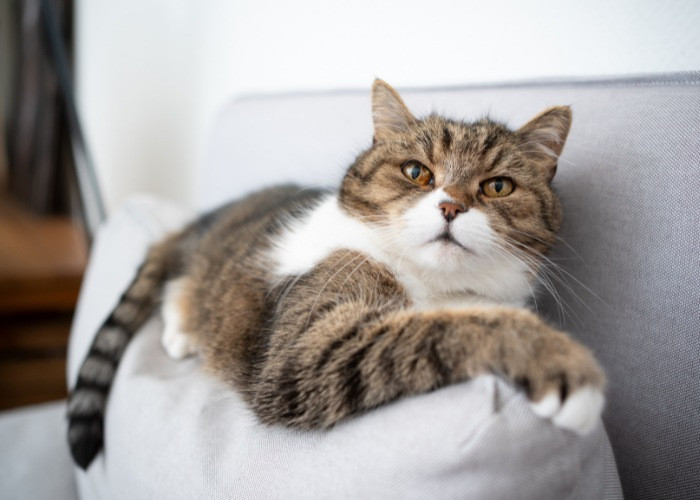 Cat sitting on a couch looking displeased
Cat sitting on a couch looking displeased
Once the affected area is thoroughly cleaned, some cat owners explore using scents to deter cats from revisiting and urinating there again. There’s a range of odors that cats generally find aversive. It’s hypothesized that this aversion may be an innate protective mechanism, as some of these scents are associated with substances that are potentially toxic to cats. Common scents disliked by cats include:
- Citrus fruits (lemon, orange, grapefruit)
- Bananas
- Mustard
- Vinegar
- Pine
- Cedar
- Peppermint
- Coffee
- Lavender
If you decide to use scents as a deterrent, prioritize pet-safe, non-toxic options. It’s crucial to exercise caution with essential oils, as many are harmful to cats if ingested, inhaled, or absorbed through the skin. Exposure to certain essential oils can lead to serious health issues in cats, including organ damage, liver failure, seizures, and even death. Similarly, coffee, including coffee grounds, is toxic to cats if ingested.
Read More: Are Humidifiers Good For Cats?
The Limitations of Scent Deterrents: Addressing the Root Cause
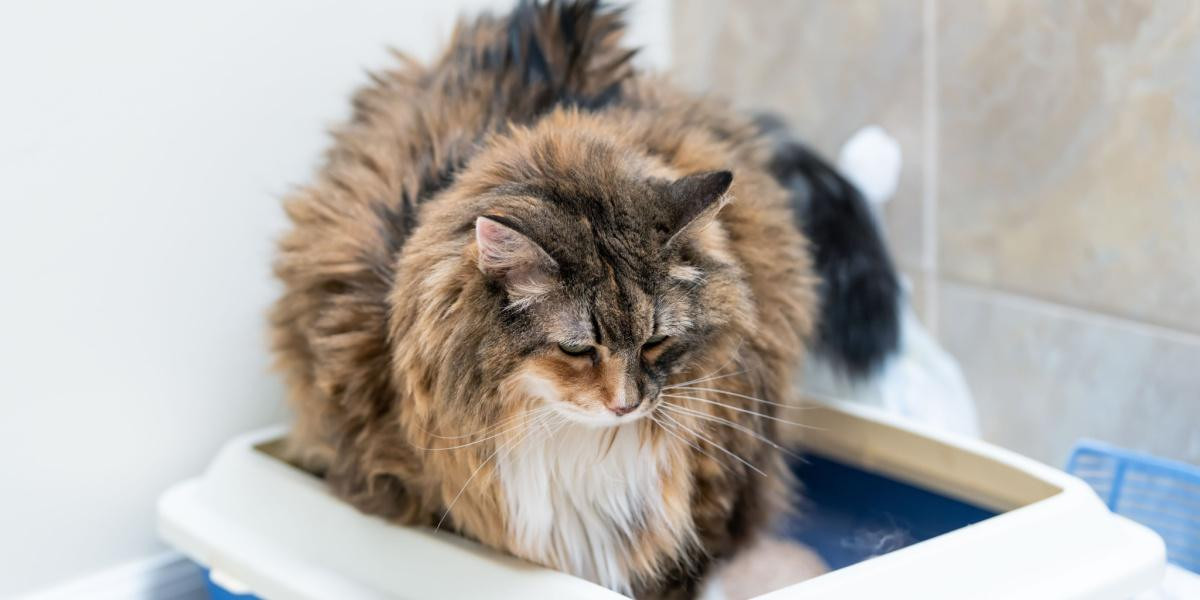 Cat sitting beside a litter box looking distressed
Cat sitting beside a litter box looking distressed
Unfortunately, relying solely on aversive scents to deter cats from peeing outside the litter box is unlikely to provide a long-term solution. If the underlying reason for the behavior isn’t addressed, the cat will likely simply avoid the scented area and find another unsuitable spot to urinate.
Cats are naturally clean animals with inherent preferences for toileting in designated areas. When a cat starts urinating outside the litter box, it’s a strong indicator that something is amiss in their environment or health. It’s crucial to understand that this behavior is not driven by spite or malice. Punishing a cat for inappropriate urination is counterproductive and can exacerbate the problem by increasing stress and anxiety.
Given their heightened sense of smell, bombarding a cat with unpleasant odors can induce significant anxiety. This anxiety can manifest in other behavioral problems and potentially worsen the inappropriate urination issue.
Instead of merely scattering lemon peels or other deterrent scents around the house, a more effective approach involves investigating and resolving the underlying cause of the house soiling.
Read More: Why Do Cats Pee On Bathroom Rugs?
Understanding Cat House Soiling
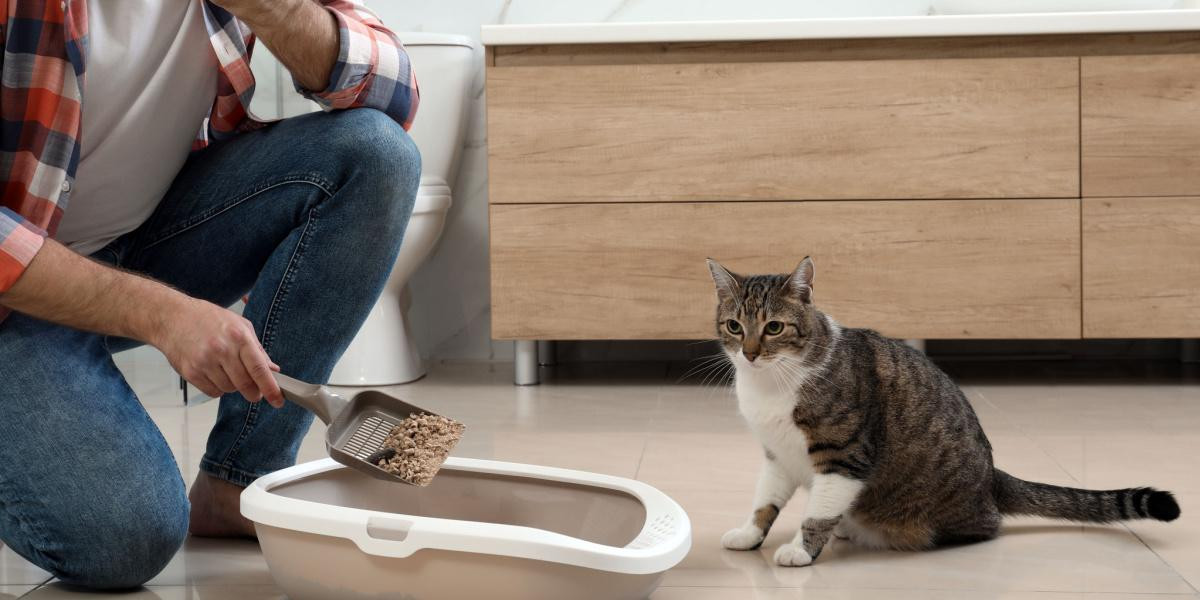 Close up of a dirty cat litter box needing cleaning
Close up of a dirty cat litter box needing cleaning
Feline house soiling is the term recommended by experts from the American Association of Feline Practitioners (AAFP) and the International Society of Feline Medicine (ISFM) to describe urination or defecation in locations deemed unacceptable by the owner. This term encompasses what is often referred to as inappropriate urination, where cats cease using their litter box and urinate elsewhere in the home. In these instances, the cat typically squats to urinate on horizontal surfaces such as carpets, bedding, bathtubs, sinks, furniture cushions, or laundry.
It’s important to distinguish house soiling from spraying, which is a territorial marking behavior. Spraying involves the cat standing with a raised, quivering tail, often treading their back feet, and spraying a small amount of urine backward onto vertical surfaces like walls, curtains, bags, or shoes.
Spraying is a normal feline communication behavior, serving as a way for cats to leave scent signals for other cats. The likelihood of spraying increases in multi-cat households. It is most prevalent in unneutered cats as part of their sexual signaling. However, approximately 10% of neutered males and 5% of neutered females may still engage in spraying. Addressing spraying behavior (stopping spraying) requires different strategies compared to addressing general house soiling (stopping cats peeing). Therefore, accurately identifying which behavior your cat is exhibiting is crucial.
Read More: Why Do Cats Wag Their Tails?
Identifying the Causes of Cat House Soiling
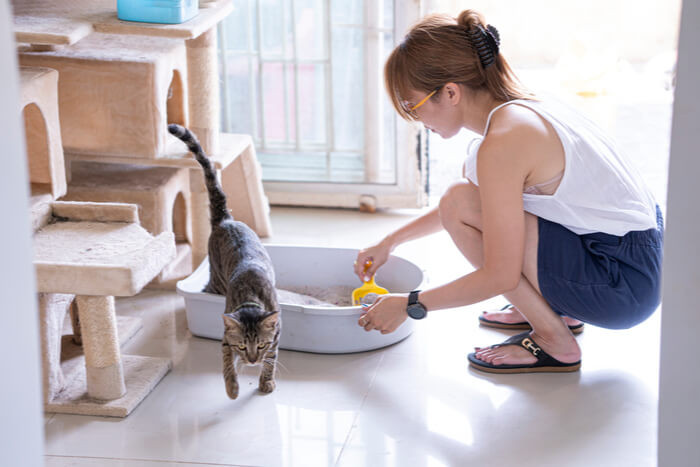 Person cleaning a cat litter box with a scoop
Person cleaning a cat litter box with a scoop
To effectively resolve house soiling, it’s essential to pinpoint the underlying cause. The first step is a veterinary check-up to rule out any medical conditions that could be contributing to the problem. Various medical issues can trigger inappropriate urination, including bladder stones, kidney disease, urinary tract infections, feline idiopathic cystitis (FIC), and diabetes.
In older cats, conditions like arthritis can make it painful or difficult to access the litter box, leading to accidents outside the box. Your veterinarian may recommend blood and urine tests, along with other diagnostic procedures like radiographs or ultrasound scans, to identify any underlying medical issues.
Once medical causes, FIC, and spraying behavior have been excluded, environmental and social factors are often the culprits behind house soiling. Litter box management plays a critical role. Consider these litter box best practices:
- Use large, uncovered litter boxes placed in quiet, private, and easily accessible locations.
- Provide one more litter box than the number of cats in the household (e.g., three boxes for two cats).
- Opt for fine-grained, unscented, clumping litter, which is generally preferred by cats.
- Scoop waste daily and perform a complete litter change and box cleaning weekly.
- Avoid any negative experiences for the cat while they are in or near the litter box, such as administering medication.
- Position litter boxes away from food and water bowls.
- In multi-cat homes, ensure that dominant cats are not blocking access to litter boxes for more timid cats.
Read More: How Do Cats Know To Use A Litter Box?
 Cat nudging a person's hand, seeking attention
Cat nudging a person's hand, seeking attention
Effective Strategies to Stop Inappropriate Urination
House soiling is not only frustrating for owners but also a significant distress signal from your cat. While deterrent scents might offer a temporary fix, addressing the root cause is crucial for a lasting solution. Here are some effective strategies to consider:
- Neuter your cat: Neutering significantly reduces urine spraying in 90% of male cats and 95% of females.
- Consult your veterinarian: Rule out medical causes and seek professional guidance and support.
- Use pheromone products: Feliway, a synthetic feline pheromone, has been shown to reduce urine spraying by up to 90%.
- Thoroughly clean soiled areas and restrict access: Use enzyme cleaners and consider covering the area with aluminum foil or plastic sheeting temporarily.
- Relocate food and water bowls: Place them in previously soiled areas, as cats are less likely to urinate near their eating and drinking spaces.
- Create positive associations: Place toys or catnip in the affected area to change the cat’s perception of the space.
- Optimize litter box management: Implement the litter box best practices mentioned earlier.
- Enhance territorial security: Use a microchip cat flap to prevent outdoor cats from entering and cover windows to minimize visual stress from seeing other cats outside.
- Temporarily adjust curtains: If curtains are a frequent target, pin them up to make them less accessible.
- In multi-cat households: Ensure an adequate distribution of resources (litter boxes, food, water, beds, hiding places) – ideally one more of each than the number of cats – to reduce stress and competition.
- Consider a pet behaviorist: If the problem persists, seek professional guidance from a certified pet behaviorist.
Read More: Why Is My Cat So Annoying? Cat Attention-Seeking Behavior Explained
In Conclusion
While aversive scents like vinegar and peppermint might temporarily deter cats from urinating in a specific spot, they are not a sustainable solution for house soiling. Unless the underlying cause of the behavior is identified and addressed, the cat will likely redirect the behavior to another location in the house.
A prompt consultation with your veterinarian is essential to rule out medical conditions. Furthermore, a comprehensive review and optimization of litter box management practices within the home is crucial for resolving and preventing house soiling issues.
Read More: The 5 Best Cat Scratch Deterrents
Frequently Asked Questions
What smells do cats hate?
Cats generally dislike strong scents such as citrus fruits, peppermint, coffee, lavender, and vinegar. Their heightened sense of smell may find these odors overwhelming. It’s also speculated that this aversion might be protective, as some of these substances (like coffee and essential oils) can be toxic to cats.
Is vinegar a good cat repellent?
Vinegar can be an effective cat repellent due to its strong, unpleasant smell, which is harmless to cats. Its cleaning properties also make it useful for cleaning areas you want to keep cats away from.
How do I stop my cat peeing everywhere?
If your cat is not neutered, neutering is often the first and most effective step to reduce or eliminate urine spraying. However, for general house soiling, veterinary consultation is crucial to rule out medical issues. Addressing behavioral factors, such as stress or litter box aversion, is also key. Pheromone therapy and optimizing litter box conditions can be beneficial. Remember, inappropriate urination is not a sign of spite or naughtiness; punishment is ineffective and can worsen the problem.
View Sources
Cats.com utilizes high-quality, credible sources, including peer-reviewed studies, to substantiate the information in our articles. Our content is regularly reviewed and updated for accuracy. Visit our About Us page to learn more about our editorial standards and veterinary review board.
- Carney HC, Sadek TP, Curtis T, et al. AAFP and ISFM guidelines for diagnosing and solving house-soiling behavior in cats. J Feline Med Surg 2014; 16(7):579-598
- catvets.com/gudelines/practice-guidelines/house-soiling
- icatcare.org
- www.cats.org.uk
Want to give your cat better care every day? Get our free day to day care guide.
Based on advice from cat behaviorists, we’ve developed a step-by-step guide to a healthy routine that brings out your cat’s best. From daily habits to yearly must-do’s, we’ve laid out everything you need to set the foundation for a stress-free, happy life.
Inside the day to day guide, you’ll find:
- Easy to understand infographics
- Checklists for simple management
- Must-do’s for a healthy cat
Get your free guide! Get your free guide!
More From Cat Psychology
Cat Behavior
What the World Looks Like from a Cat’s Perspective
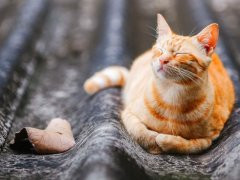 ginger cat laying on roof
ginger cat laying on roof
Cat Behavior
How Cold Is Too Cold for Cats?
Cat Behavior
Why Do Cats Bunny Kick? 3 Fascinating Reasons Behind This Behavior
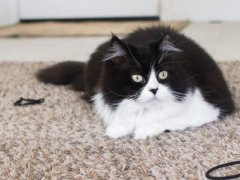 Cat lounging on a brown shag carpet, encompassed by black hair ties
Cat lounging on a brown shag carpet, encompassed by black hair ties
Cat Behavior
5 Adorable Reasons Why Cats Like Hair Ties
Popular in the community
Cat Health
The Complete Feeding Guide From Kittens to Seniors
 Illustration showcasing the intelligence of cats, emphasizing their problem-solving abilities and cognitive prowess.
Illustration showcasing the intelligence of cats, emphasizing their problem-solving abilities and cognitive prowess.
Cat Behavior
Are Cats Smarter Than Dogs? Scientists May Finally Have the Answer
Cat Names
300 Best Grey Cat Names With Meanings
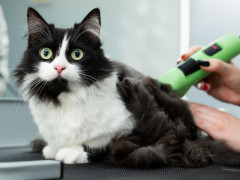 Shave-A-Cat-1-240×180
Shave-A-Cat-1-240×180
Cat Basics
Can You Shave a Cat?
One thought on ““What Smells Deter Cats From Peeing?””
- Add Comment
